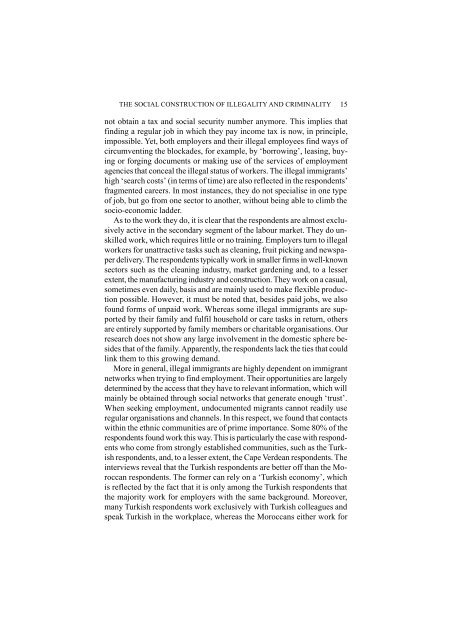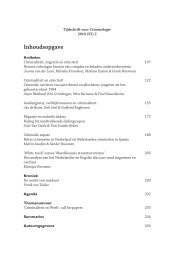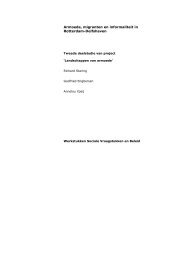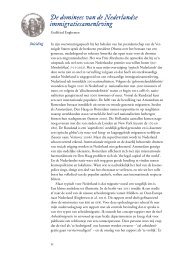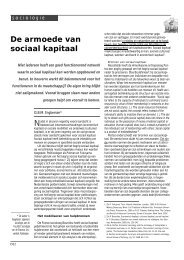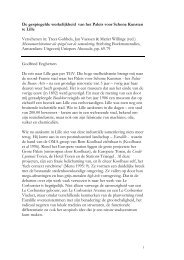THE SOCIAL CONSTRUCTION OF ILLEGALITY AND CRIMINALITY ...
THE SOCIAL CONSTRUCTION OF ILLEGALITY AND CRIMINALITY ...
THE SOCIAL CONSTRUCTION OF ILLEGALITY AND CRIMINALITY ...
Create successful ePaper yourself
Turn your PDF publications into a flip-book with our unique Google optimized e-Paper software.
<strong>THE</strong> <strong>SOCIAL</strong> <strong>CONSTRUCTION</strong> <strong>OF</strong> <strong>ILLEGALITY</strong> <strong>AND</strong> <strong>CRIMINALITY</strong> 15<br />
not obtain a tax and social security number anymore. This implies that<br />
finding a regular job in which they pay income tax is now, in principle,<br />
impossible. Yet, both employers and their illegal employees find ways of<br />
circumventing the blockades, for example, by ‘borrowing’, leasing, buying<br />
or forging documents or making use of the services of employment<br />
agencies that conceal the illegal status of workers. The illegal immigrants’<br />
high ‘search costs’ (in terms of time) are also reflected in the respondents’<br />
fragmented careers. In most instances, they do not specialise in one type<br />
of job, but go from one sector to another, without being able to climb the<br />
socio-economic ladder.<br />
As to the work they do, it is clear that the respondents are almost exclusively<br />
active in the secondary segment of the labour market. They do unskilled<br />
work, which requires little or no training. Employers turn to illegal<br />
workers for unattractive tasks such as cleaning, fruit picking and newspaper<br />
delivery. The respondents typically work in smaller firms in well-known<br />
sectors such as the cleaning industry, market gardening and, to a lesser<br />
extent, the manufacturing industry and construction. They work on a casual,<br />
sometimes even daily, basis and are mainly used to make flexible production<br />
possible. However, it must be noted that, besides paid jobs, we also<br />
found forms of unpaid work. Whereas some illegal immigrants are supported<br />
by their family and fulfil household or care tasks in return, others<br />
are entirely supported by family members or charitable organisations. Our<br />
research does not show any large involvement in the domestic sphere besides<br />
that of the family. Apparently, the respondents lack the ties that could<br />
link them to this growing demand.<br />
More in general, illegal immigrants are highly dependent on immigrant<br />
networks when trying to find employment. Their opportunities are largely<br />
determined by the access that they have to relevant information, which will<br />
mainly be obtained through social networks that generate enough ‘trust’.<br />
When seeking employment, undocumented migrants cannot readily use<br />
regular organisations and channels. In this respect, we found that contacts<br />
within the ethnic communities are of prime importance. Some 80% of the<br />
respondents found work this way. This is particularly the case with respondents<br />
who come from strongly established communities, such as the Turkish<br />
respondents, and, to a lesser extent, the Cape Verdean respondents. The<br />
interviews reveal that the Turkish respondents are better off than the Moroccan<br />
respondents. The former can rely on a ‘Turkish economy’, which<br />
is reflected by the fact that it is only among the Turkish respondents that<br />
the majority work for employers with the same background. Moreover,<br />
many Turkish respondents work exclusively with Turkish colleagues and<br />
speak Turkish in the workplace, whereas the Moroccans either work for


